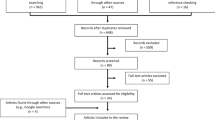Abstract
The American health-care system has undergone rapid growth and structural change over the past 20 years. Because of the increase in expenditures flowing into the system, total employment in the industry has increased significantly. Along with total employment, the employment of black women has also grown. Unfortunately, however, black women continue to be concentrated in the lowest paying of the health occupations. Efforts to improve the occupational distribution of blacks in general and black women in particular are going to be more difficult in the future because of the dominance of cost containment as the nations primary health policy goal.
Similar content being viewed by others
Notes
U.S. Department of Health and Human Services,Health, United States, 1984 (Washington, D.C.: U.S. Government Printing Office, 1984).
Health, United Stales, 1984.
Eli Ginzberg and Miriam Ostow. “Organization and Financing of Medical Care,”Medical Care 23, no. 5 (May 1985): 421–431.
Health, United States, 1984.
Ginzberg and Ostow andHealth, United States, 1984.
Unpublished data from the Department of Labor.
James Curtis,Blacks, Medical Schools and Society (Ann Arbor: University of Michigan Press. 1971).
Manning Marable, “Black Education, Economics, and Social Policy: An Historical Perspective” (Working paper presented to Brandeis University Heller School. September 1985).
“Datagram,”Journal of Medical Education 57. (June 1982).
U.S. Department of Health and Human Services,Report of the Graduate Medical Education National Advisory Commission, Interim Report (Washington, D.C.: Public Health Service. 1980).
Fred McKinney. “The Demand for Allied Health and Nursing Personnel by Employment Setting:where Will the Jobs be in 1990 and 2000?” (Paper submitted to the Commonweallth Fund, September 1985).
Telephone conversation with representative of Local 1199 of New York City, August 20. 1985.
U.S. Department of Commerce, Bureau of the Census,Detailed Population Characteristics, United States Summary, 1980 Census of the Population (Washington, D.C.: GPO. 1982).
U.S. Department of Health and Human Services,Report to the President and Congress on the Status of Health Personnel in the United States (Washington, D.C.: Public Health Service. 1984).
R.B. Sutcliffe.Industry and Underdevelopment (London: Addison-Wesley Publishing, 1971).
Health, United States. 1984.
Health, United States, 1984.
Frederick W. McKinney,Market Determinants of the Distribution and Quality of Physicians’ Services (Ph.D. dissertation. Yale University 1983).
Karen Davis and Cathy Schoen,Health and the War on Poverty (Washington, D.C.: The Brookings Institution, 1978).
Hospital Corporation of America,Annual Report, 1984.
Arnold Relman, “The New Medical-Industrial Complex,”The New England Journal of Medicine 303, no. 17 (October 23, 1980) 963–970.
American Hospital Association,Hospital Statistics, 1984 (Chicago: American Hospital Association, 1984).
Frederick W. McKinney. “The Demand for Allied Health.”
Frederick W. McKinney. “The Demand for Allied Health.”
Ruth Hanft, “Minorities and the Health Professions in the 1980s,”Health Affairs 3, no. 4 (Winter 1984): 71–84.
About this article
Cite this article
McKinney, F. Employment implications of a changing health-care system. The Review of Black Political Economy 14, 199–215 (1985). https://doi.org/10.1007/BF02689887
Issue Date:
DOI: https://doi.org/10.1007/BF02689887




